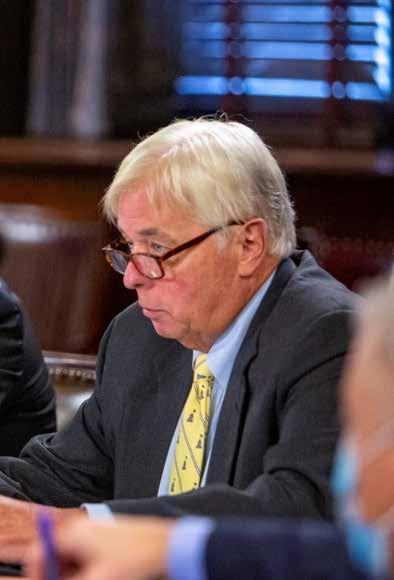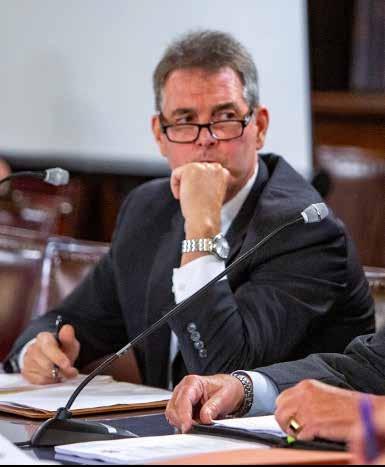
5 minute read
PA House Judiciary Committee Looks at Police Reforms and Pennsylvania Law Enforcement Training
By: Chief John English, Edgeworth Borough Police, PCPA President
Police involved shootings, in separate but recent incidents that happened in the State, had Pennsylvania lawmakers looking into the training that Pennsylvania officers receive to prepare for those split-second decision-making occurrences. Those incidents, as well as others elsewhere in the state and nationally, have sparked questions about racial disparity in policing and lethal use of force. The House Judiciary Committee spent several hours being briefed by representatives of the law enforcement community on the training officers receive for those times when use of force is required, and other issues related to Pennsylvania’s police agencies. Executive Director Scott L. Bohn and I represented the PCPA at the Judiciary Committee hearing on September 15, 2020. During my testimony, I stated that there are approximately 23,000 municipal officers in Pennsylvania trained in accordance with Act 120 who serve an estimated 1,072 departments. Some of the police departments are very large while others may have one or two personnel. I noted that Municipal police in Pennsylvania receive their basic training at one of 24 training academies across the Commonwealth. Of these academies, 5 are operated by municipalities and 14 are operated by colleges or the Pennsylvania State System of Higher Education. The Pennsylvania State Police operates an Academy in Hershey plus 4 Regional Training Centers each authorized to conduct Act 120 training. We offered testimony that the basic police training curriculum teaches
Advertisement
John English, President of the Pennsylvania Chiefs of Police Association told the House Judiciary Committee that “Officers receive a lot of training to help them make those split-second decisions in life and death situations but still any officer that says that he’s never been afraid out there is lying to you.” Pa. House of Representatives Sept. 15, 2020
traditional basic police training such as report writing, and criminal procedures, plus police officers are provided training to recognize mental illness, intellectual disabilities, and autism. Officers are provided proper techniques to interact with and de-escalate individuals engaging in behavior indicative
of mental illness, or intellectual disability. Trainees receive training in community-oriented policing and problem solving as well. In summary, the Basic Police Syllabus totals 919 hours of training. We explained that trainees currently received training that was developed directly from the 21st Century Policing and other national initiatives. Cultural awareness training is taught to help the trainees identify the behaviors that foster and those that harm effective minority community relations. The goal is to foster effective communications with those they are sworn to protect and to establish police legitimacy. The Association also added testimony on the Pennsylvania Law Enforcement Accreditation Program; offering testimony that Accreditation is a progressive and proven way of helping agencies evaluate and improve their overall performance. Testimony was offered on the uniqueness and relevance to Pennsylvania law enforcement demonstrated by over 139 standards and 200 bullet points (sub-standards) specific to legislated legal mandates. The mandates govern a wide array of standards for law enforcement agencies including key requirements for policy development and training on use of force, pursuit, evidence and property management, domestic violence and a multitude of issues that will have policy impact upon policing agencies in Pennsylvania. The Association testified that Accreditation is a symbol of quality. It shows that the organization meets specified performance standards and supplies an opportunity for that organization to evaluate their operation against national and statewide standards. Meeting standards promotes research, exhibits broad thinking, and attention to detail. House members questioned representatives from the Pennsylvania Chiefs of Police Association in regards to additional training or resources that need to be provided to officers to prevent them being afraid for their lives as a defense, should a police-involved shooting case go to court. As the PCPA President I replied, “Officers receive a lot of training to help them make those split-second decisions in life and death situations but still any officer that says that he’s never been afraid out there is lying to you.” “There’s no one size-fits-all response to those situations, each of which tend to be unique requiring different responses.” “You can’t put it all in one basket and say from now on you are going to do this, this and this. You have to adjust.” The testimony I gave addressed concerns about the shortage of individuals applying to police academies. I’ll use the Allegheny County Police Academy as an example, "In the past there was a waiting list to get into this academy. Now I think the last number I heard was 13 in the academy class. That is a fraction of what it used to be, and this is a concern. There is not a whole lot of people that are signing up to take the positions of the officers [who] are basically escaping. Officers feel that they don’t have the support of elected officials. In prior testimony before the House Majority Committee I had testified that, “In general, a lot of police officers are upset and questioning whether they should stay in the profession. I fear that many men and women won’t step in to take their place.” My comments reflect a broader perspective among officers that some state lawmakers have abandoned their support for law enforcement, further inflaming the anti-police rhetoric that underpins sometimes destructive and violent protests unfolding across the country. “Several officers have said they just don’t feel comfortable coming to work anymore.” “They say they’ll be here and do their job, but they don’t feel excited about it anymore and I’m hearing it throughout the state.”
Scott L. Bohn, Executive Director

In addition to the Association’s testimony, Les Neri, president of the Fraternal Order of Police Pennsylvania Lodge, testified that a policing standpoint with nearly 1,100 police departments in Pennsylvania, many departments are staffed with part-time officers who work for multiple departments. He noted that this was problematic. Money is often the reason why so many have part-time officers and why few can offer officers training beyond the 12 hours of continuing education they are annually required to receive. House Judiciary Committee Chairman Rob Kauffman, Franklin County, shared that the committee will be visiting the state police academy in Hershey to witness police training firsthand as the committee continues its look at police reform laws that are needed. Emanuel Kapelsohn, of Peregrine Corporation, said he has provided expert testimony in police-involved shooting cases nationally. He supported that decision. He said lawmakers need to have some knowledge about what a police officer has to know and understand before passing laws that affect how those officers do their job.









